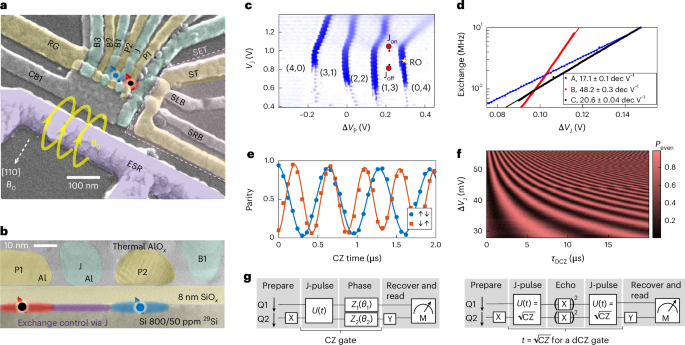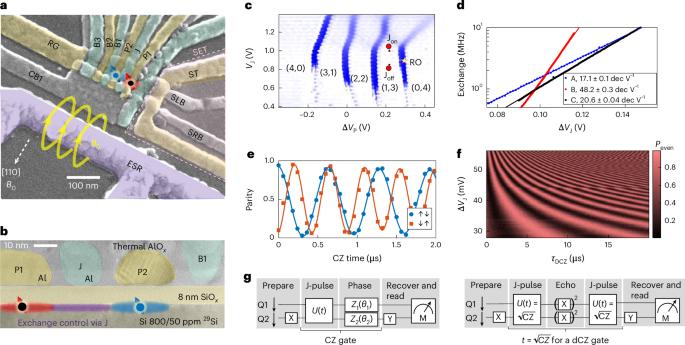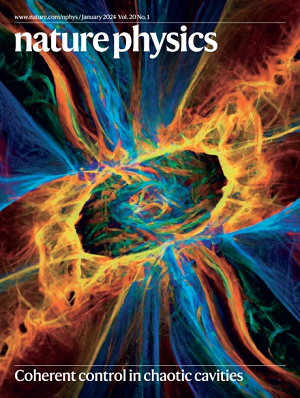Assessment of the errors of high-fidelity two-qubit gates in silicon quantum dots
IF 17.6
1区 物理与天体物理
Q1 PHYSICS, MULTIDISCIPLINARY
引用次数: 0
Abstract
Achieving high-fidelity entangling operations between qubits consistently is essential for the performance of multi-qubit systems. Solid-state platforms are particularly exposed to errors arising from materials-induced variability between qubits, which leads to performance inconsistencies. Here we study the errors in a spin qubit processor, tying them to their physical origins. We use this knowledge to demonstrate consistent and repeatable operation with above 99% fidelity of two-qubit gates in the technologically important silicon metal-oxide-semiconductor quantum dot platform. Analysis of the physical errors and fidelities in multiple devices over extended periods allows us to ensure that we capture the variation and the most common error types. Physical error sources include the slow nuclear and electrical noise on single qubits and contextual noise that depends on the applied control sequence. Furthermore, we investigate the impact of qubit design, feedback systems and robust gate design to inform the design of future scalable, high-fidelity control strategies. Our results highlight both the capabilities and challenges for the scaling-up of silicon spin-based qubits into full-scale quantum processors. For solid-state qubits, the material environment hosts sources of errors that vary in time and space. This systematic analysis of errors affecting high-fidelity two-qubit gates in silicon can inform the design of large-scale quantum computers.


评估硅量子点中高保真双量子比特栅极的误差
在量子比特之间持续实现高保真纠缠操作对多量子比特系统的性能至关重要。固态平台尤其容易受到材料引起的量子比特之间的变化所产生的误差的影响,从而导致性能不一致。在这里,我们研究了自旋量子比特处理器中的误差,并将其与物理根源联系起来。我们利用这些知识,在具有重要技术意义的硅金属氧化物半导体量子点平台上,展示了保真度超过 99% 的双量子比特门的一致性和可重复性操作。通过长期分析多个器件中的物理误差和保真度,我们可以确保捕捉到变化和最常见的误差类型。物理误差源包括单量子比特上的慢核噪声和电噪声,以及取决于应用控制序列的上下文噪声。此外,我们还研究了量子比特设计、反馈系统和稳健门设计的影响,为设计未来可扩展的高保真控制策略提供信息。我们的研究结果凸显了将基于硅自旋的量子比特升级为大规模量子处理器的能力和挑战。
本文章由计算机程序翻译,如有差异,请以英文原文为准。
求助全文
约1分钟内获得全文
求助全文
来源期刊

Nature Physics
物理-物理:综合
CiteScore
30.40
自引率
2.00%
发文量
349
审稿时长
4-8 weeks
期刊介绍:
Nature Physics is dedicated to publishing top-tier original research in physics with a fair and rigorous review process. It provides high visibility and access to a broad readership, maintaining high standards in copy editing and production, ensuring rapid publication, and maintaining independence from academic societies and other vested interests.
The journal presents two main research paper formats: Letters and Articles. Alongside primary research, Nature Physics serves as a central source for valuable information within the physics community through Review Articles, News & Views, Research Highlights covering crucial developments across the physics literature, Commentaries, Book Reviews, and Correspondence.
 求助内容:
求助内容: 应助结果提醒方式:
应助结果提醒方式:


